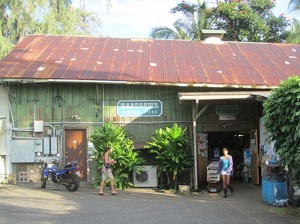
Dr. Amy Schneider has returned to the Andover Family Practice on Lawrence Street with a wealth of new experiences and perspectives after practicing medicine in rural Hawaii and Ireland.
Dr. Schneider graduated from Harvard Medical School in 1978, opening her Tilton practice three and a half years later. In 2004, she and much of her clientele relocated to Andover, becoming the first medical practice in town in over 30 years. Upon the retirement of her husband in 2011, Schneider felt it was time for a change. LRGHealthcare took over the practice, and Dr. Schneider set out for adventure.
She became involved in programs for locum tenens (“locums”), which are temporary positions for healthcare professionals. Dr. Schneider had always wanted to try practice in other places and also wanted to practice outside the United States. She decided to apply for an Irish medical license, and while waiting for that to come through, she had the opportunity to do a locum in a rural community in Hawaii.

Dr. Schneider was located in Hana, a town about the size of Andover, located in eastern Maui. “Hana is one of the most remote areas in the state,” Dr. Schneider explains. “There is one winding, single-lane road that goes there, and it takes about two and a half hours to get to the hospital or supermarket.”
Dr. Schneider worked in the local health center, located in the old hospital. “There were two physicians,” she explained. “I covered from 8 AM Monday morning to 8 AM Thursday morning, in the clinic all day and on call for all emergencies.”
As a result of the remote location, Dr. Schneider experienced many challenges. “Hana attracts a large alternative population, people who want to get off the grid,” she noted. “There were a lot of people who didn’t like traditional medicine and would only come in for grave emergencies. There were also a lot of tourists who tended to be more into adventure, so there were many accidents. I saw a lot of lacerations and broken bones, things I wouldn’t see around here because people would go to an emergency room at the hospital. There was also a lot of chronic illness there, such as asthma, hypertension, diabetes, and gout.
“In a way, it was easy and comfortable practicing [in Andover]. I was used to things, and nothing that walked in the door would surprise me.
“Being in Hana, I got used to surprises. There were things I will never see again: centipede bites, man o’ war stings, and major surfing injuries.” Dr. Schneider concludes, “It was a very different environment. It was stressful, but wonderful.”
On to Rural Ireland
Ireland also proved to be a unique experience with a medical system much different than the United States. “Most physicians saw between 40 and 50 patients per day, so you learn to be very tolerant and efficient. If patients wanted to see a specialist, they had to wait. Some things took time, but everyone got the care they needed.
“Even though it was busy, the physicians seemed very happy there, less stressed than the United States. The system is organized well enough that doctors can go away on vacation for a week or two.”
In fact, most locums in Ireland only last for one week, just enough to cover vacation time for physicians. Dr. Schneider spent her first week in Tullow, a town just southwest of Dublin, but travelled north soon after. “We went up to County Donegal, the northernmost county. I was on the Inishowen Peninsula in a town called Buncrana, just 20 minutes from Londonderry, Northern Ireland. The facility had two semi-permanent locums from South Africa who would travel home for a month at a time. I filled in for one of them.”
Along with professional experience, Dr. Schneider also enjoyed the newfound cultural experiences. “When we first were driving up to Buncrana, there was a woman on the side of the road with produce from her farm. You can only buy potatoes in a 50-pound sack. We were only going to be up there for five weeks, and there’s no way I would ever have gone through so many potatoes here, but that was the smallest bag she had.
“You know, I’m in this place, and these are fresh potatoes that just taste totally different than what we have, and you start eating like the people there. We had mashed potatoes every night. So we actually finished the bag in three weeks.
“I just love travelling and living in an area so I get to know the community. We got to experience things differently and understand the culture better.”
Dr. Schneider has now returned to the local practice with a new breadth of experience, both professional and personal. But further locums are not in Dr. Schneider’s forseeable future. “I would love to keep doing things like this, but right now I feel it’s time to be here for a little while. I’m working two days a week back here, and I’m going to be doing that, until I’m not.”